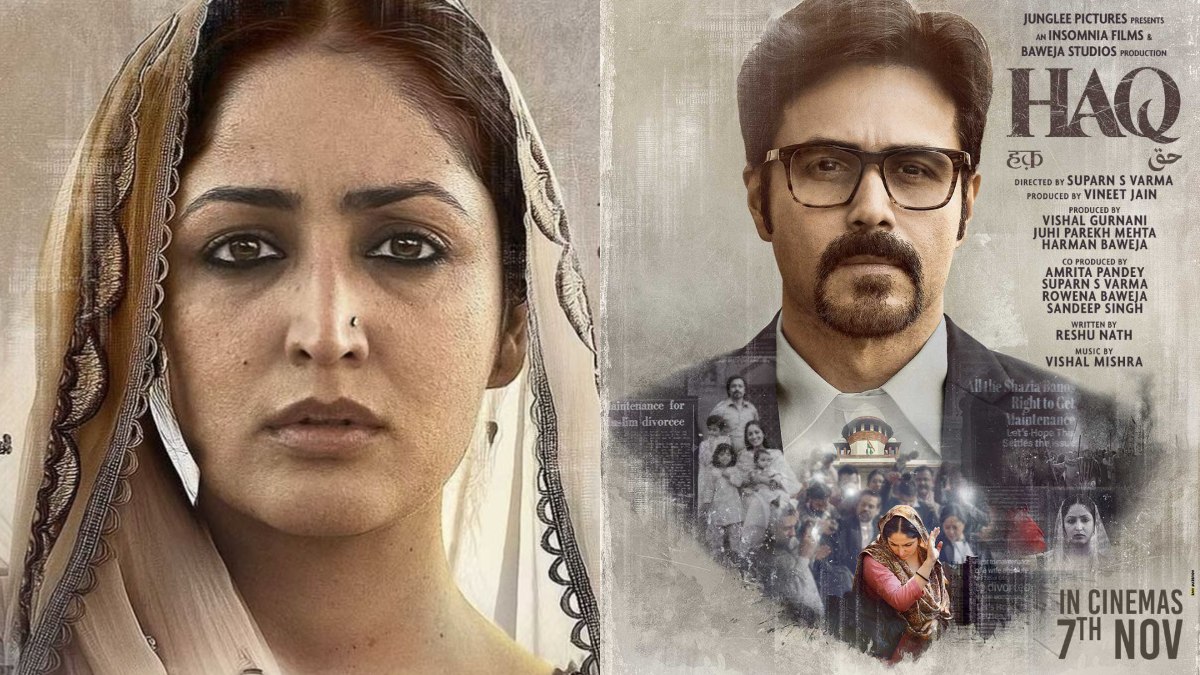HAQ – A Thought-Provoking Examination of Personal Rights and Religious Interpretation
At the outset, this review begins by acknowledging that HAQ is not a quintessential, run-of-the-mill Bollywood entertainer. Although the film is constructed within a commercial framework, it maintains a serious and topical narrative, and the filmmakers have ensured that it remains focused on its thematic core.
HAQ is inspired by the landmark 1985 Shah Bano case and is adapted from the book Bano: Bharat Ki Beti, written by Jigna Vora. Writer Reshu Nath draws from the case’s thematic essence but creates an entirely new narrative, introducing significant changes in character portrayal. The film primarily follows the life of Shazia Bano (a fictionalized representation), her marriage to Advocate Abbas Khan, and the emotional and legal upheaval that ensues when he marries a second time, resulting in a “talaq” and the initiation of a court case.
Reshu Nath’s screenplay is notably tight and well-paced. The first half of the film is devoted to establishing Shazia’s domestic life  priorto the court proceedings, while the second half transitions into a compelling courtroom drama. Several scenes are written with striking emotional resonance, most notably Shazia’s climactic monologue and the deeply affecting interactions between her and her father. One of the film’s most commendable achievements is its humanistic portrayal of the conflict. It refrains from casting clear antagonists, even in characters like Shazia’s husband and his second wife. Instead, the narrative emphasizes how interpretations of Sharia law, as referenced in the Holy Koran, are often shaped by personal and societal convenience.
priorto the court proceedings, while the second half transitions into a compelling courtroom drama. Several scenes are written with striking emotional resonance, most notably Shazia’s climactic monologue and the deeply affecting interactions between her and her father. One of the film’s most commendable achievements is its humanistic portrayal of the conflict. It refrains from casting clear antagonists, even in characters like Shazia’s husband and his second wife. Instead, the narrative emphasizes how interpretations of Sharia law, as referenced in the Holy Koran, are often shaped by personal and societal convenience.
The film’s powerful script is supported by a stellar cast. Yami Gautam Dhar delivers a standout performance as Shazia Bano. Her transformation from a reserved housewife into a determined crusader for her and her children’s rights is portrayed with nuance and conviction. It stands as one of the finest performances of her career and warrants critical recognition. Emraan Hashmi portrays
Advocate Abbas Khan with measured restraint, effectively humanizing a complex character, particularly in the courtroom sequences, where he excels. Danish Husain brings gravitas to the role of Maulvi Basheer Anwar, Shazia’s father. His dignified performance enhances the emotional core of the father-daughter relationship. Sheeba Chaddha, as Advocate Bela Jain, adds considerable strength to the narrative with her commanding screen presence. The supporting cast likewise delivers compelling performances, contributing to the overall impact of the film.
Director Suparn Verma, after a decade of working in cinema and more recently in the OTT space (The Family Man, Rana Naidu, The Trial), finds his most significant directorial voice with HAQ. He handles the sensitive subject matter with maturity, restraint, and precision, demonstrating both technical proficiency and emotional intelligence. His ability to elicit layered performances from his cast is particularly noteworthy. HAQ undoubtedly represents a milestone in his directorial career.
In conclusion, HAQ is a bold and thought-provoking film, grounded in a real social issue and elevated by powerful performances and intelligent storytelling. At a time when mainstream Bollywood is often criticized for shying away from substantive themes, HAQ stands out as a cinematic work that invites reflection and discourse. It is a film that lingers in the viewer’s consciousness long after the
credits roll.
I will go with: 4.5 Stars
OTT partner- Netflix

